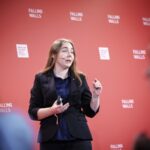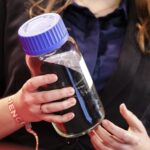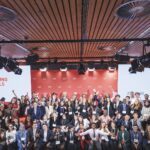Veronika Šedajová: The Falling Walls finale broadened my horizons
Thanks to her victory in the national round of the Falling Walls Lab science communication competition, the physical chemist Veronika Šedajová from CATRIN took part in the global finale in Berlin in early November. A total of one hundred finalists competed for the title Science Breakthrough of the Year in the Emerging Talents category. This global, interdisciplinary contest gives students and early-career researchers the opportunity to present their innovative ideas in just three minutes. Participants presented their research and proposed solutions to an expert jury made up of representatives from academia, industry and the public sector.
Veronika, what did you present in Berlin?
I presented our material—nitrogen-doped graphene for use in supercapacitors. I focused on the potential use of a supercapacitor containing our material in next-generation pacemakers and explained the benefits it could bring. I also mentioned that our research has already progressed from the lab towards practical application within the Trans2DChem project, and that we have founded the spin-out company Atomiver, where we are already able to produce the material in larger quantities.
As an experienced science communicator, what was different about this competition for you?
The format was very specific because of the extremely limited time. We were allowed only two slides and three minutes, which couldn’t be exceeded. So we were all under a lot of pressure to fit everything in. We presented before a jury made up of representatives of various scientific disciplines, so I had to make sure the information was understandable to everyone, not just colleagues from my field. It was important to show that the research is groundbreaking and to highlight its benefits for society.
Were you nervous? After all, it was the global finale with a hundred young scientists competing.
Given the significance and scale of the event, I was nervous—but I have to say I prepared for this competition more than for any other. I learned my script word for word to stay within the time limit. My colleague Martin Pykal helped me enormously by creating visualisations of what I wanted to present. I was also supported by the science communicator Vendula Lužná from Palacký University, as well as the community around the Žárovky endowment fund. It was extremely helpful to talk to Czech finalists from previous years, who gave me many useful recommendations. And I am very grateful to Barbora Boušová from the Czech office of DAAD: German Academic Exchange Service, who travelled with me to Berlin, for her support and encouragement.
How did you enjoy the presentations given by the other finalists?
It was very enriching to see what problems researchers from different countries around the world are tackling. From the follow-up discussions I also learned what kind of resources colleagues—for example in Africa or South America—do or do not have, and how they collaborate internationally. It really opens your eyes and gives you a new perspective. The event definitely broadened my horizons, and I plan to listen to the presentations again because I wasn’t able to fully concentrate on all of them. As I learnt later from conversations with the other finalists, I was actually quite easy to recognise thanks to my props—I had the supercapacitor that I carry with me everywhere and a large bottle of graphene.
The presentations took place over a single day, but together with the other finalists you could attend the whole Science Summit. What did that bring you?
We had a very demanding programme, during which we visited university departments and the laboratories of the Max Planck Institute. The weekend was dedicated to networking. We could attend any lectures we wanted, and there were dedicated networking sessions with representatives of major industrial players. You could talk to people from different sectors and possibly even find someone to collaborate with in the future. Many people were approaching us, so it was certainly very useful. I also met representatives of the Czech Embassy in Berlin and described our research to the ambassador.
Will science communication remain something you want to pursue alongside your research and company work? Was the competition a new impulse?
I’ve always enjoyed science communication, and to some extent it helps me push my own boundaries. I’m rather prone to stress, and events like this teach me to calm down and present science to people who are not experts. The advice we received in Berlin will definitely be useful in the future—whether when presenting scientific results or within a company. I still consider science popularization important, but I don’t have any special plans. I’m letting things flow—we’ll see.





